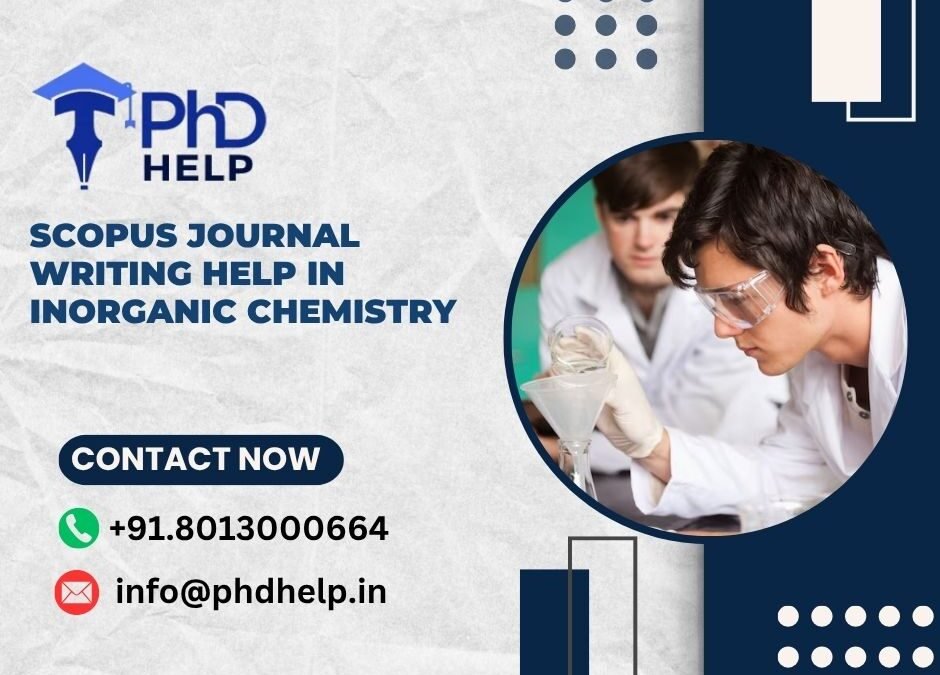SCOPUS journal writing help in Inorganic Chemistry
SCOPUS journal writing help in Inorganic Chemistry. Publishing in a SCOPUS-indexed journal is the hallmark of impactful academic research, especially in the field of Inorganic Chemistry. With the ever-growing advancements in coordination chemistry, solid-state materials, organometallics, bioinorganic frameworks, and catalytic systems, inorganic chemists must align their research presentation with stringent international standards. Our specialized SCOPUS journal writing help in Inorganic Chemistry offers researchers a comprehensive, expert-guided pathway from idea conception to final publication in globally recognized journals.
Why Publish Inorganic Chemistry Research in SCOPUS Journals?
SCOPUS-indexed journals offer unparalleled visibility, impact, and academic credibility. Publishing your Inorganic Chemistry paper in a SCOPUS journal means:
-
Enhanced global discoverability by academic peers and industry professionals
-
Compliance with academic institution mandates and PhD requirements
-
Eligibility for international funding and collaborative opportunities
-
Recognition from research councils and hiring committees
-
Access to a wider scientific community for knowledge exchange
Whether your research involves transition metals, metalloenzymes, or nanostructured oxides, SCOPUS publication ensures your work stands out in the scientific world.
Our End-to-End Inorganic Chemistry SCOPUS Writing Services
We provide complete assistance to researchers, scholars, and scientists in Inorganic Chemistry aiming to publish in SCOPUS-indexed journals. Our services cover:
-
Research topic finalization and hypothesis development
-
Scientific manuscript writing from scratch
-
Technical and language editing as per journal standards
-
Graphical abstracts, reaction schemes, and figure preparation
-
Data analysis, crystallography assistance, and spectral interpretation
-
Journal selection, formatting, and submission support
-
Reviewer comment response and resubmission assistance
Key Areas of Expertise in Inorganic Chemistry
Our team of PhD-qualified experts and journal editors has proven experience across all major subfields of Inorganic Chemistry:
-
Coordination and Organometallic Chemistry
-
Solid-State and Materials Chemistry
-
Bioinorganic Chemistry
-
Main Group and Transition Metal Chemistry
-
Supramolecular and Crystal Engineering
-
Inorganic Reaction Mechanisms
-
Catalysis and Surface Chemistry
-
Lanthanide and Actinide Chemistry
Custom Manuscript Writing for SCOPUS Journals
Writing a research paper that meets SCOPUS standards involves more than technical knowledge—it requires strategic structuring, academic tone, and clarity. Our writers deliver:
-
Abstract: Concise, keyword-rich, and impactful
-
Introduction: Framing the research problem with literature gaps
-
Experimental Section: Detailed procedures, instrumentation, and protocols
-
Results and Discussion: Interpretation with mechanistic insights, tables, and spectra
-
Conclusion: Summary of findings, applications, and future scope
-
References: Properly formatted citations (ACS, RSC, APA, etc.)
We ensure the manuscript aligns with your target journal’s scope and adheres to their submission guidelines.
Spectroscopic and Structural Data Support
Inorganic Chemistry publications often require extensive data interpretation. We assist with:
-
X-ray Crystallographic Data (CIF files, ORTEP diagrams, refinement details)
-
NMR (1H, 13C, 31P, etc.), IR, UV-Vis, EPR, and Mass Spectral Analysis
-
Thermal analysis (TGA, DSC)
-
Surface area and porosity data for porous materials
-
Magnetic susceptibility and redox property interpretation
All spectral and analytical data are validated for accuracy and presented as high-quality publication-ready figures.
Scientific Editing and Proofreading
Our editing team, composed of native English-speaking editors and chemical scientists, performs multi-level manuscript polishing:
-
Language editing for grammar, spelling, and syntax
-
Technical editing for clarity, consistency, and scientific rigor
-
Formatting and referencing as per journal guidelines
-
Plagiarism checks with Turnitin or iThenticate (on request)
-
Cover letter drafting tailored to each journal’s editorial board
Our goal is to ensure your manuscript is free from errors and positioned for quick acceptance.
Targeted SCOPUS Journal Selection
Choosing the right journal can significantly influence your paper’s success. We assist in:
-
Identifying journals with matching scope, audience, and impact factor
-
Verifying indexing status and editorial expectations
-
Avoiding predatory publishers and non-SCOPUS outlets
-
Managing all technical aspects of submission, communication, and tracking
Top SCOPUS-indexed journals in Inorganic Chemistry we recommend:
-
Inorganic Chemistry (ACS)
-
Dalton Transactions (RSC)
-
European Journal of Inorganic Chemistry
-
Inorganica Chimica Acta
-
Polyhedron
-
Journal of Coordination Chemistry
-
Chemical Communications
-
Journal of Molecular Structure
Responding to Peer Review Comments
Peer reviewers often provide suggestions for improvement before acceptance. We support you in:
-
Understanding reviewer feedback with expert interpretation
-
Rewriting sections or experiments where necessary
-
Drafting effective rebuttal letters
-
Handling technical queries related to spectral data or methodology
-
Ensuring timely resubmission and follow-ups
Our support continues until your paper is formally accepted and published.
Ethical Writing and Confidentiality Assurance
We strictly follow ethical academic practices and protect your intellectual property at every stage:
-
Zero plagiarism guarantee with plagiarism reports
-
Non-disclosure agreements (NDAs) for sensitive or proprietary data
-
Compliance with COPE and journal ethics policies
-
Proper acknowledgments and author contribution statements
We respect your research and treat your data with the highest level of confidentiality and integrity.
Who Can Use Our SCOPUS Inorganic Chemistry Services?
-
PhD and MPhil candidates submitting mandatory SCOPUS publications
-
Postdoctoral researchers publishing novel work in high-impact journals
-
University faculty fulfilling tenure or funding prerequisites
-
Industry scientists reporting on materials or catalysis research
-
Independent chemists aiming to gain academic recognition
We cater to chemists across academic, research, and industrial domains.
Why Partner with Us for Inorganic Chemistry Journal Writing?
-
PhD experts in Inorganic Chemistry with publication credentials
-
Custom, high-quality content tailored to your research
-
Full-cycle support from topic selection to final acceptance
-
Affordable pricing with premium quality assurance
-
On-time delivery and unlimited revisions
-
Responsive, client-focused service model
We combine scientific depth with editorial excellence to help your research get published in prestigious SCOPUS journals.
Start Your SCOPUS Publication Journey Today
Let your inorganic chemistry innovations reach global recognition. With our dedicated SCOPUS journal writing help in Inorganic Chemistry, you get the strategic, technical, and editorial edge needed for successful international publication.
Thank you for read our blog “SCOPUS journal writing help in Inorganic Chemistry”
Also read our more BLOG here
For PhD writing help Contact: +91.8013000664 || info@phdhelp.in

